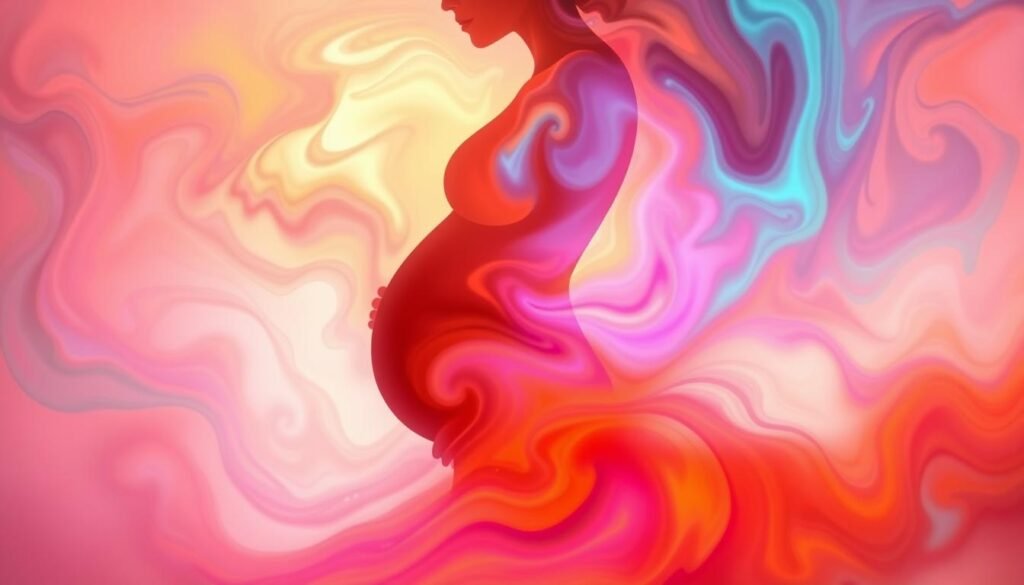Did you know that over 50 different hormones play pivotal roles in our bodies? These hormones are key to regulating essential functions. They change during puberty, pregnancy, and menopause. These shifts are natural but can cause strong emotional and physical symptoms. It’s hard for many people to deal with these changes. Hormonal imbalances can affect your mood, metabolism, and reproductive health. It’s vital to understand hormone health to manage these changes well.
In this guide, we’ll look into the reasons behind hormonal shifts and their effects. We’ll discuss the symptoms of imbalances and how to handle these changes. Since hormonal fluctuations are unique to each person, knowing more about them is powerful. It can help people find the right support and better their lives.
Key Takeaways
- Hormonal shifts affect physical and emotional health significantly.
- Common causes of hormonal imbalance include puberty, pregnancy, menopause, and stress.
- Both men and women experience unique symptoms related to hormonal imbalances.
- Monitoring hormone health can help prevent serious conditions like diabetes or osteoporosis.
- Consulting healthcare professionals is essential for managing hormonal changes effectively.
What Are Hormonal Shifts?
Hormonal shifts are changes in hormone levels due to life stages or health issues. The human body has over 50 hormones that control vital functions. These include metabolism, mood, growth, and reproduction. Life events like puberty, pregnancy, menopause, and andropause can trigger these shifts. So can stress, diet, and illness.
Unbalanced hormones may cause health problems. Addison’s disease, polycystic ovary syndrome (PCOS), and diabetes can upset hormone production. This may lead to issues like irregular periods, hair loss, or acne. Hormone imbalances can also make you feel anxious or depressed and affect your sleep.
Estrogen and progesterone changes are especially significant. Low estrogen can cause decreased desire, vaginal dryness, and discomfort during sex. Changes in testosterone may lead to hair loss in men. It’s vital to monitor hormones for good health.
| Hormonal Imbalance Effects | Possible Symptoms |
|---|---|
| Low Estrogen | Vaginal dryness, low libido, discomfort during sex |
| High Testosterone (in females) | Acne, excessive hair growth |
| Thyroid Hormone Imbalance | Weight gain, fatigue, mood changes |
| Insulin Resistance | Increased blood sugar levels, potential diabetes |
Knowing the signs of hormonal shifts is key to your health. If you’re aware, you can get the right tests. These include blood or urine tests to check hormones.
Causes of Hormonal Shifts
Hormonal shifts happen for many reasons linked to a person’s health. Puberty, pregnancy, and menopause can change hormone levels. Also, chronic stress can cause hormonal imbalances. It can upset the balance of hormones, causing different symptoms.
Thyroid disorders also affect hormone levels. Conditions like hypothyroidism and hyperthyroidism can change your weight and energy. Diet, exercise, and substance use can lead to hormonal imbalances too. Meanwhile, certain medicines and health issues like diabetes or PCOS also play a role.
To really understand hormonal shifts, it’s key to see how these factors mix and impact health. Hormones need to be in balance, like a recipe. Small changes can have big effects. If you have symptoms of hormonal imbalance, getting a doctor’s help is a good step.
Hormonal Shifts During Puberty
Puberty is a key time when kids go through big hormonal changes. These changes shape their bodies and minds, taking 2 to 4 years. During this time, the body grows from a child’s form into an adult’s.
Physical Changes and Symptoms
Puberty brings many physical changes. For girls, breasts start to grow as the first sign, sometimes as early as age 8. About two years after breasts start to grow, girls usually get their first period, between ages 9 and 16. They also hit a growth spurt before their first period, growing 1–2 more inches after it.
Boys start puberty between 9 and 14 years old. Their growth spurt happens from ages 12 to 15. After this, their muscles keep developing, even after they stop getting taller, usually by 16. Both boys and girls will see secondary sexual characteristics like more body hair, voice changes, and body shape changes due to increased adrenal androgens.
Emotional and Psychological Effects
The hormonal changes of puberty don’t just change the body. They also affect emotions. Kids might feel mood swings, get easily upset, and feel anxious. It’s important for them to get support from parents, teachers, or doctors during this time. These emotional ups and downs are normal and can be handled.
To learn more about puberty’s changes, check out more on hormonal shifts during puberty.
Hormonal Shifts During Pregnancy
Pregnancy is an incredible journey filled with hormonal shifts. These shifts are key for the baby’s development and help the mother’s body adapt. Exploring the main hormones during this time shows their impact on health and mood.
Key Hormones Involved
Estrogen and progesterone levels go up a lot during pregnancy. Estrogen hits its highest in the last trimester. Progesterone stays very high the whole time. These hormones help the body make a lot of changes, like:
- Increased blood flow and heart work
- Adjustments in kidney and lung functions
- Growth of breast tissue for milk
Other hormones, like glucocorticoids, help with stress and keep the body healthy during this big change. Knowing about these hormonal changes is crucial for taking good care of moms-to-be.
Effects on Body and Mood
Pregnancy hormones cause many mood and body changes. Women might feel mood swings or be more sensitive. Physical changes can happen like:
| Physical Change | Description |
|---|---|
| Breast Changes | Tenderness, darker areolas, and bigger nipples get the body ready for feeding the baby. |
| Swelling | A bit of swelling often happens in the second trimester and might last into the third. |
| Food Preferences | Pregnant women might want more salty and sweet foods and notice taste changes. |
Pregnancy weight gain makes the body work harder. This affects energy levels and how active moms can be. Understanding these signs and their link to hormones helps explain pregnancy’s whole experience.

Hormonal Shifts During Menopause
Menopause is a big change in a woman’s life, usually starting around 51. It can happen earlier for some. This time brings changes in hormones, especially a drop in estrogen and progesterone. These lead to different symptoms that are easy to notice.
Symptoms of Menopause
The symptoms of menopause are different for each woman. They can include:
- Hot flashes (experienced by about 75% of women)
- Night sweats, which are common and disrupt sleep
- Vaginal atrophy, causing discomfort during intercourse
- Urinary incontinence due to pelvic muscle relaxation
- Mood changes affecting mental health
About 80% of women see their hot flashes get better within two years. Managing these symptoms is important during this time.
Impact on Weight and Metabolism
During menopause, weight and metabolism become big concerns. Hormonal changes may make it harder to keep a healthy weight. They can also change where fat is stored on the body. This can happen because of a slower metabolism.
To handle these changes, women might need to eat differently and exercise more. Eating foods rich in phytoestrogens, like soybeans and lentils, may help. These can ease some menopause symptoms and help with metabolism.
| Symptom | Prevalence | Effective Management Strategies |
|---|---|---|
| Hot Flashes | 75% of women | Hormone Therapy, Lifestyle Changes |
| Night Sweats | Common | Avoiding Triggers, Medication |
| Vaginal Atrophy | Common | Lubricants, Estrogen Creams |
| Urinary Incontinence | Variable | Pelvic Floor Exercises, Medications |
Understanding these symptoms is key for women going through this natural life stage. Being aware of hormonal changes helps women adjust more easily.
The Experience of Andropause
Andropause, often called male menopause, happens when testosterone levels drop in men over 40. This period causes symptoms in males that can change daily life. It’s key for men to realize these signs to seek ways to get better in health and happiness.
Symptoms and Effects in Males
Andropause brings several symptoms in men. Common ones include:
- Fatigue and less energy.
- Lower sex drive and erectile issues.
- Mood changes and irritability from changing testosterone.
- Hard time losing weight and keeping muscle.
These symptoms differ for each person, but they can disturb both private and work life. Studies show around 30% of men over 50 feel strongly affected by these hormonal changes.
Hormonal Changes and Treatments
After 40, testosterone goes down about 1% every year, challenging many with andropause. Eating right is crucial now. Foods high in vegetables, lean proteins, and whole grains help, while it’s best to cut down on fats and sugars. Making diet changes could be key for men with low testosterone.

Being active is vital in handling andropause symptoms. Mixing interval and strength training helps with weight and muscle. Staying active improves mood and energy. Also, it’s important for men to talk openly with doctors about their symptoms. This ensures treatments fit each person, maybe including testosterone therapy. Doctors think about the good and bad points of each treatment option.
Looking for more ways to handle hormonal changes? Sites like natural relief for anxiety provide good advice on coping strategies.
Thyroid Disorders and Hormonal Shifts
Thyroid disorders affect the body’s hormonal balance significantly. Conditions like hypothyroidism and hyperthyroidism change how your body works. They influence metabolism and energy, which can lead to symptoms such as weight gain and tiredness.
About 1 in 20 Americans over twelve experience hypothyroidism. Meanwhile, hyperthyroidism appears in about 1 in 100 people. Women are more likely to face these issues, being five to eight times more at risk. A notable statistic points out that 1 in 8 women will encounter thyroid problems during their lives.
Shift work has a notable impact on thyroid hormones. It alters sleep and health due to irregular hours. Research shows it disturbs hormones, especially in women who work night shifts. This area requires more study to understand its full effects.
Recognizing thyroid disorder signs is vital. Hypothyroidism may cause fertility problems and ovarian cysts. Hyperthyroidism affects menstrual cycles and puberty. During pregnancy, these issues pose risks to both mother and child, like pre-eclampsia and miscarriage. Addressing these conditions early is key to avoid problems.
| Condition | Prevalence | Effects |
|---|---|---|
| Hypothyroidism | Affects 1 in 20 Americans | Fatigue, weight gain, ovulation issues |
| Hyperthyroidism | Affects 1 in 100 individuals | Anxiety, irregular menstrual periods, bone health issues |
| Thyroid Disorders in Women | 1 in 8 will develop issues | Increased risk of postpartum complications |
| Thyroid Cancer | 56,870 new cases in 2017 | Most common in women, rapidly increasing incidence |
Recognizing Hormonal Imbalance Symptoms
It’s vital to know the symptoms of hormonal imbalance to spot health problems early. These symptoms can look and feel different for everyone. They affect both your mind and body. Spotting them early can help you get the right care and feel better.
Mood Changes and Mental Health
Mood swings can happen when your hormone levels change. You might feel:
- Increased anxiety
- Depressive episodes
- Unexplained irritability
- Insomnia or disrupted sleep patterns
These changes can really affect your mental health. It’s important to deal with them quickly. Changes in hormones like estrogen and progesterone can mess with your brain, making you feel emotionally unsteady.
Physical Symptoms of Imbalance
Hormonal imbalances also cause physical problems like:
- Heavy or painful periods
- Unexplained weight gain
- Chronic acne or skin changes
- Fatigue and low energy levels
- Bone density loss
- Vaginal dryness
Spotting these signs helps you understand your health better. For instance, acne might mean your hormones are changing, while tiredness could hint at hormone fluctuations. Remember, symptoms can depend on whether you’re going through menopause or pregnancy.
| Symptom | Possible Cause |
|---|---|
| Heavy or painful periods | Hormonal fluctuations |
| Low libido | Estrogen and testosterone levels |
| Insomnia | Stress and hormonal changes |
| Fertility issues | Age-related hormonal changes |
| Weak bones | Falling estrogen levels |
By understanding both mood and physical symptoms of hormonal imbalance, you can get the right help. This can improve your life a lot.
Endocrine Disruption and its Impact
Endocrine disruption interferes with our hormone system. It causes big changes in our health. These disruptions come from chemicals found in environmental pollutants, pesticides, and some medicines.
With around 4,000 of these harmful chemicals identified, their effect on our health gets worrisome. These chemicals, known as endocrine-disrupting chemicals (EDCs), pose a real risk to human health.
EDCs mess with how our bodies make and handle hormones. They can increase or block hormone production or how hormones connect to cells. This can lead to health issues.
Studies link EDC exposure to diseases like obesity and diabetes. For example, a study found a link between diabetes and high levels of certain pollutants.
It’s not just chemicals that cause problems. Artificial light, radiation, and stress also disrupt our hormones. The rise in EDCs in everyday things, like food packaging and makeup, calls for carefulness.
Chemicals such as atrazine and products with lavender oil are concerning. Some studies suggest they might interfere with our hormones, affecting health and development.
Managing Hormonal Shifts with Lifestyle Changes
Making lifestyle changes can greatly help with hormonal shifts. By eating right and managing stress, you can better balance your hormones. We will look at important foods to eat and ways to handle stress for good hormone health.
Diet and Nutrition
Eating a balanced diet is key for keeping hormone levels steady. Adding whole foods that are rich in nutrients to your meals helps hormones work well. Here are some tips for eating right:
- Prioritize Protein: Try to get at least 25–30 grams of protein in each meal. This helps control hunger.
- Increase Fiber Intake: Eating a lot of fiber helps control insulin and makes you feel full.
- Include Healthy Fats: Foods with omega-3 fats, like fatty fish and olive oil, are good for insulin levels and hormones.
- Limit Sugary and Processed Foods: Eating less sugar, especially from sweet drinks, keeps your hormones in check and lowers your risk of obesity and diabetes.
- Drink Green Tea: Green tea can lower insulin levels, which is good for your hormones.
Stress Management Techniques
Handling stress well is also important for dealing with hormonal shifts. Too much stress can raise cortisol, which throws hormones off balance. Here are ways to manage stress:
- Practice Regular Exercise: Staying active helps regulate hormones that control hunger and reduces stress.
- Introduce Relaxation Techniques: Doing yoga and meditating lowers stress hormones and makes you feel stable.
- Ensure Quality Sleep: Sleeping well for at least seven hours a night is vital for keeping hormones like insulin and cortisol balanced.

By adjusting your diet and managing stress, you can really improve your ability to handle hormonal shifts. Making these good choices is the foundation for long-term health and hormone balance.
Hormonal Replacement Therapy Options
Hormonal replacement therapy helps manage symptoms of hormonal shifts, especially during menopause. It uses hormones like estrogen and progesterone to ease hot flashes, mood swings, and bone loss. Knowing the benefits and risks helps people make wise health care choices.
Benefits and Risks
The main benefits of hormonal replacement therapy include:
- Reduction in hot flashes and night sweats
- Improved mood and mental health
- Lower risk of bone loss and osteoporosis
- Better overall quality of life
But, there are risks with hormonal replacement therapy. Some risks are:
- Greater chance of breast cancer
- Increase in heart issues, like heart attacks or strokes
- Possible blood clots
- Side effects like bloating, mood changes, and nausea
Choosing hormonal replacement therapy should include talks with a doctor. It’s about balancing benefits and risks, and thinking about personal health.
Alternative Therapies Available
For those unsure about hormonal therapy, there are alternatives. Options include:
- Herbal supplements, such as black cohosh and red clover
- Non-hormonal medicines, like SSRIs for mood
- Vaginal moisturizers and lubricants for dryness
- Lifestyle changes, like diet and stress management
Each option offers benefits for managing hormone-related symptoms. Looking into these alternatives helps find the right support for hormonal health.
| Type of Therapy | Benefits | Risks |
|---|---|---|
| Hormonal Replacement Therapy | Relieves hot flashes, improves mood, protects against osteoporosis | Increased cancer risk, cardiovascular issues, blood clots |
| Herbal Supplements | Natural symptom relief, fewer side effects | Limited scientific support, potential interactions with medications |
| Non-Hormonal Medications | Effective mood management | Potential side effects similar to antidepressants |
| Lifestyle Changes | Improved overall well-being | Needs continuous effort and dedication |
Conclusion
It’s vital to understand hormonal changes at different life stages. This knowledge helps us deal with symptoms like anxiety and mood changes. Knowing about hormones like estrogen, cortisol, and testosterone is the key.
Making lifestyle changes, looking into medical help, and using natural methods can improve life during hormonal shifts. Stress management and eating right are important. Also, talking to healthcare professionals offers personalized help for hormonal issues.
As our society ages, with people 65 and older expected to reach 83.7 million by 2050, focusing on hormonal health is crucial. For a deeper look at hormones and mental health, check out this complete guide on understanding hormones. Learning about this topic is the first step towards a balanced, happy life.